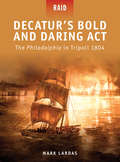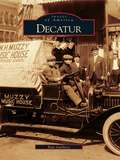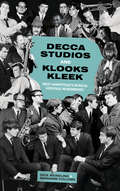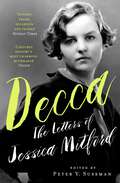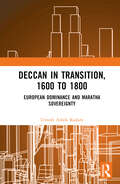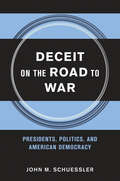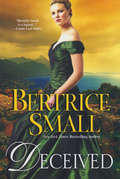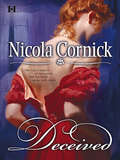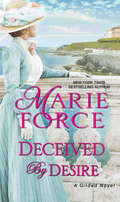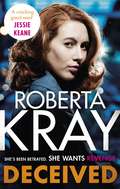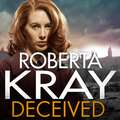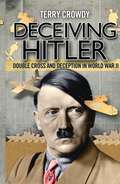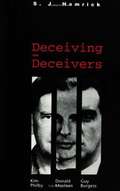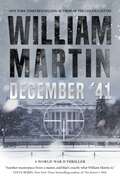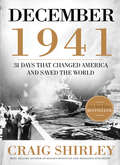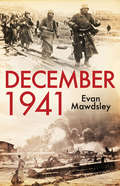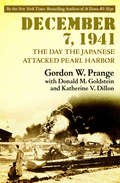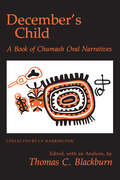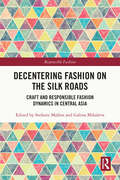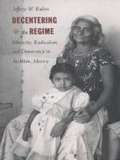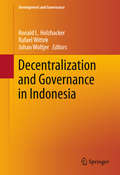- Table View
- List View
Decatur's Bold and Daring Act- The Philadelphia in Tripoli 1804
by Steve Noon Mark LardasOn a dark night in 1804, Lt. Stephen Decatur and a team of hand-picked men, slipped into Tripoli harbor in a small boat. Their target was the USS Philadelphia. Captured by the Barbary pirates four months previously, the Philadelphia had been refitted to fight against her former masters. Decatur's mission was to either recapture the ship, or failing that, burn her to the waterline. This book recounts one of the greatest raids in American military history, an event that propelled Stephen Decatur to international renown, and which prompted Horatio Nelson to declare it 'the most bold and daring act of the age'.
Decatur: 1832-1945 (Images of America)
by Dan GuilloryDecatur, Illinois has long had a proud tradition of workers and craftsmen who produced coal, water pumps, gloves, automobiles, clothing, corn meal, and many other products. Though it is home to Caterpillar's second largest plant and serves as world headquarters for Archer Daniels Midland, a global processor of corn and soybeans, Decatur is much more than jobs and factories. If Illinois is the Heartland, then Decatur is the Heart of the Heartland. Decatur is the site of Abraham Lincoln's first Illinois residence, in 1830, and it is where he was nominated for the presidency on May 10, 1860. Decatur is also home to a symphony orchestra, homes designed by Frank Lloyd Wright, a community college, and Millikin University.
Decca Studios and Klooks Kleek: West Hampstead’s Musical Heritage Remembered
by Dick Weindling Marianne CollomsConsiderable attention has been given to the EMI Abbey Road Studios in St Johns Wood, particularly because of their association with the Beatles. In contrast, very little has been written about their great rivals Decca, who had recording studios in nearby Broadhurst Gardens, West Hampstead. This book will explore the history of Decca and specifically the Studios, where thousands of records were made between 1937 and 1980. Klooks Kleek, meanwhile, ran from 1961 to 1970 in the Railway Hotel, next door to the Decca Studios. Dick Jordan and Geoff Williams, who ran the club, share their memories here. With artists including David Bowie, The Rolling Stones, Tom Jones and The Moody Blues at Decca, and Ronnie Scott, The Cream, Fleetwood Mac, Led Zeppelin, Jimi Hendrix, Eric Clapton, Elton John, Rod Stewart, Stevie Wonder and Sonny Rollins at Klooks, this book records a unique musical heritage. Containing more than fifty photographs, many of which have never before appeared in print, it will delight music lovers everywhere.
Decca: The Letters of Jessica Mitford
by Jessica Mitford'These letters are a treat ... as an example of what a woman can do once she has rid herself of, or at least decided to ignore, the expectations of others - family, men, society - Jessica Mitford will always take some beating' OBSERVER'Captures history's most charming muckraker, from her friendships with Katharine Graham and Maya Angelou to her devotion to civil rights' VOGUE'Jessica Mitford is a sister of mine. If I had to go into a room with a leopard, I wouldn't hesitate to ask for her' Maya AngelouOver her 78 years, Decca's letters reveal a remarkable life - from her childhood as the daughter of a British peer to her scandalous elopement to the Spanish Civil War with her cousin, to her life in the USA, where she married a radical lawyer. The Mitford girls included Diana (who married the British fascist leader Oswald Mosley), Unity (who was close to Adolf Hitler) and Debo (who became the Duchess of Devonshire). Decca shocked them all when she joined the American Communist Party. Her letters are the stories of a century: gossip and politics, war and mores, the wonders of rapid technological change, the poignancy of personal struggles. They are also a record of her never-ending quest for social justice. This is a fascinating collection that reveals to us intimately the most ebullient Mitford of them all.
Deccan in Transition, 1600 to 1800: European Dominance and Maratha Sovereignty
by Umesh Ashok KadamThis book presents the socio-cultural and historical trajectories of the Deccan plateau as well as the coastal areas of the current states of Andhra Pradesh, Maharashtra, Karnataka and Goa. It studies the art of diplomacy by discussing the diplomatic relations between the Marathas and various European companies, as well as the indigenous regional states. The author also probes into the Maratha naval policy, the evolution of a composite Deccani culture and the cultural flux that was taking place within the Maratha country. Through an interdisciplinary lens, the volume examines how caste and gender relations operated, how the idea of dissent was generated as well as the socio-political impact of various linguistic, ethnic and religious groups. Through a study of monuments, sculpture and paintings prevalent in the region, the book also discusses the developments in art and architecture in the Deccan. Rich in archival sources, this book is a must read for scholars and researchers of Indian history, colonial history, South Asian history, Maratha history and history in general.
Deceit on the Road to War: Presidents, Politics, and American Democracy (Cornell Studies in Security Affairs)
by John M. SchuesslerIn Deceit on the Road to War, John M. Schuessler examines how U.S. presidents have deceived the American public about fundamental decisions of war and peace. Deception has been deliberate, he suggests, as presidents have sought to shift blame for war onto others in some cases and oversell its benefits in others. Such deceit is a natural outgrowth of the democratic process, in Schuessler's view, because elected leaders have powerful incentives to maximize domestic support for war and retain considerable ability to manipulate domestic audiences. They can exploit information and propaganda advantages to frame issues in misleading ways, cherry-pick supporting evidence, suppress damaging revelations, and otherwise skew the public debate to their benefit. These tactics are particularly effective before the outbreak of war, when the information gap between leaders and the public is greatest. When resorting to deception, leaders take a calculated risk that the outcome of war will be favorable, expecting the public to adopt a forgiving attitude after victory is secured. The three cases featured in the book--Franklin Roosevelt and World War II, Lyndon Johnson and the Vietnam War, and George W. Bush and the Iraq War--test these claims. Schuessler concludes that democracies are not as constrained in their ability to go to war as we might believe and that deception cannot be ruled out in all cases as contrary to the national interest.
Deceived
by Bertrice Small“Bold, earthy sensuality…” —Library Journal DECEIVED Golden-haired Aurora Kimberly possesses only one passion—to live a simple life on the lush island paradise bequeathed to her family by the English Crown. Now her peace is about to be threatened by the appearance of Valerian Hawkesworth, Duke of Farminster, who has arrived to claim his own prize—an heiress promised to him in a marriage contract. But the free-spirited beauty has no intention of letting some pompous duke carry her off to cold and gloomy England. Her sister Cally, who has always yearned for the luxurious life of a duchess, agrees to switch places. But can the sisters hope to play out this charade successfully? And what sweet revenge will the duke demand once he discovers the deception? Only a twist of fate and the power of an indomitable love can change the heart of a man scorned…
Deceived
by Nicola Cornick"Rumor has it a certain notorious Princess has not a feather to fly and is looking for a gentleman to ease her financial worries. Perhaps the Earl of S. is the man she seeks...." -- The Gentleman's Mercury, 1816Princess Isabella never imagined it could come to this. Bad enough she faces imprisonment for debts not her own. Even worse that she must make a hasty marriage of convenience with Marcus, the Earl of Stockhaven--the man she'd loved and lost so long ago. But that he now wants revenge by demanding she be his in more than name only...well, that is simply intolerable!As the London gossips eagerly gather to watch the fun, Isabella struggles to maintain a polite distance in her marriage. But the more Isabella challenges Marcus's iron determination, the hotter their passion burns. This time, will it consume them both--or fuel a love greater than they dare dream?
Deceived by Desire (Gilded #2)
by Marie ForceFor fans of HBO&’s The Gilded Age, explore the dazzling world of America&’s 19th century elite in this lush series of sparkling, page-turning love stories… From New York Times bestselling author Marie Force comes a glittering tale of star-crossed romance set amid the lavish mansions and decadent lifestyles of early 20th century Newport, Rhode Island. But even in an age of great fortune, the heart has its own idea of true riches . . . Wealthy American industrialist Aubrey Nelson has invited the Duke and Duchess of Westbrook to visit his family&’s Newport seaside &“cottage&” for the summer. With his parents&’ departure from New York delayed, Aubrey&’s mother sends him ahead to oversee preparations for their guests. But when he arrives, he&’s surprised to find the house and staff in disarray . . . With much to do and little time, Aubrey comes to rely on the housekeeper, a lovely young Irish woman named Maeve Brown. And when he also finds himself confiding in Maeve about more personal matters, he tells himself it&’s merely their close proximity that draws him to the compassionate, hard-working beauty. Yet when he suspects Maeve is in danger, Aubrey realizes his feelings for her have grown much deeper than they should have. For what will his mother, who dreams of a society match for her son, have to say when she arrives to discover he&’s lost his heart to a girl of the working class?Praise for Duchess by Deception&“Force has crafted a masterpiece with the perfect amount of romance.&”—Publishers Weekly, STARRED REVIEW
Deceived: THE BRAND NEW NOVEL. No one knows crime like Kray.
by Roberta KrayTHE NEW GRITTY CRIME THRILLER: NO ONE KNOWS CRIME LIKE KRAY'A cracking good read' Jessie Keane'Well into Martina Cole territory' IndependentSHE TRUSTED THE WRONG MAN...Judith Jonson has been a widow for five years. At first, she hoped Dan would return, but her dream turned to a nightmare as the war ended, and she had to accept her beloved husband was never coming home.Then one day she sees a picture in the paper - the aftermath of a dramatic robbery in London's West End - and Judith can't believe her eyes. It's Dan, she'd stake her life on it, or rather his life, the traitor.Betrayed and desperate for answers Judith begins a hunt for the man she thought she married. And in amongst the lowlifes of the East End's gangland underworld she finds more than she bargained for.But Judith had better be careful whose business she meddles in. The rule of law doesn't apply in Kellston. She had been deceived, but she doesn't want to end up dead...Praise for Roberta Kray:'Action, intrigue and a character-driven plot . . . sure to please any crime fiction fans' Woman 'Gripping' Daily Express
Deceived: the must-read, gripping crime novel from the bestselling author
by Roberta Kray'A cracking good read' JESSIE KEANEThe must-read gangland crime novel from bestseller Roberta KraySHE'S BEEN BETRAYED . . .Judith Jonson has been a widow for five years, after the untimely death of her husband Dan. Then one day she sees a picture in the paper - the aftermath of a dramatic robbery in London's West End - and Judith can't believe her eyes. It's Dan, she'd stake her life on it. Or his life, rather.SHE WANTS REVENGE.Judith begins a hunt for the man she thought she married, and in amongst the lowlifes of the East End's underworld she finds more than she bargained for. But Judith had better be careful; the rule of law doesn't apply in Kellston. She's been deceived, but she doesn't want to end up dead . . .Full of the same danger and grit as it's London's setting, this is bestselling author Roberta Kray at the top of her game. Get ready for a KILLER read . . .Praise for ROBERTA KRAY:'Well into Martina Cole territory' Independent'Action, intrigue and a character-driven plot . . . sure to please any crime fiction fans' Woman'Gripping' Daily Express'Great writing, gripping story, loved it' Mandasue Heller
Deceived: the must-read, gripping crime novel from the bestselling author
by Roberta KraySHE'S BEEN BETRAYED . . . Judith Jonson has been a widow for five years, after the untimely death of her husband Dan. Then one day she sees a picture in the paper - the aftermath of a dramatic robbery in London's West End - and Judith can't believe her eyes. It's Dan, she'd stake her life on it. Or his life, rather. SHE WANTS REVENGE. Judith begins a hunt for the man she thought she married, and in amongst the lowlifes of the East End's underworld she finds more than she bargained for. But Judith had better be careful; the rule of law doesn't apply in Kellston. She's been deceived, but she doesn't want to end up dead . . . Full of the same danger and grit as it's London's setting, this is bestselling author Roberta Kray at the top of her game. Get ready for a KILLER read . . .
Deceiving Hitler: Double-cross and Deception in World War II
by Terry CrowdyDuring the Second World War the Allies controlled every active German agent in Britain. This placed Allied Intelligence services in a unique position. The Allies were able to feed spurious information back to Germany which mixed scraps of truthful information with misleading details in a believable mix of information. Out of this process of deception grew an entire organization which specialized in the manufacture of elaborate deceptions to confuse and hinder Axis powers. To maintain the deception, complex camouflage and tactical deception operations were to be undertaken on the ground, involving the use of inflatable tanks, fake towns which misdirected the German blitz, bogus troop formations and a catalog of Hollywood-style special effects. At times bizarre and often intriguing, these operations were used in all the major theaters of the war and saved countless Allied lives. From disappearing North African pipelines to bogus radio stations, this book is an entertaining and absorbing account of the deceptions used by the Allies in World War II. The third in a series of books by Terry Crowdy that exposes the underworld of military history, Deception uses rare, recently declassified information and photographs, much of which is being made available to the public for the first time to reveal the art of military misdirection.
Deceiving the Deceivers: Kim Philby, Donald Maclean and Guy Burgess
by S. J. HamrickAmong the more sensational espionage cases of the Cold War were those of Moscow's three British spies--Kim Philby, Donald Maclean, and Guy Burgess. In this riveting book, S. J. Hamrick draws on documentary evidence concealed for almost half a century in reconstructing the complex series of 1947-1951 events that led British intelligence to identify all three as Soviet agents. Basing his argument primarily on the Venona archive of broken Soviet codes released in 1995-1996 as well as on complementary Moscow and London sources, Hamrick refutes the myth of MI5's identification of Maclean as a Soviet agent in the spring of 1951. British intelligence knew far earlier that Maclean was Moscow's agent and concealed that knowledge in a 1949-1951 counterespionage operation that deceived Philby and Burgess. Hamrick also introduces compelling evidence of a 1949-1950 British disinformation initiative using Philby to mislead Moscow on Anglo-American retaliatory military capability in the event of Soviet aggression in Western Europe. Engagingly written and impressively documented,Deceiving the Deceiversbreaksnew ground in reinterpreting the final espionage years of three infamous spies and in clarifying fifty years of conjecture, confusion, and error in Anglo-American intelligence history.
December '41: A World War II Thriller
by William MartinFrom New York Times bestselling author William Martin comes a WWII thriller as intense as The Day of the Jackal and as gripping as The Eye of the Needle. In December '41, Martin takes us on the ultimate manhunt, a desperate chase from Los Angeles to Washington, D. C., in the first weeks of the Second World War. On the day after Pearl Harbor, shocked Americans gather around their radios to hear Franklin Roosevelt declare war. In Los Angeles, a German agent named Martin Browning is planning to kill FDR on the night he lights the National Christmas Tree. Who will stop him? Relentless FBI Agent Frank Carter? Kevin Cusack, a Hollywood script reader who also spies on the German Bund of Los Angeles, and becomes a suspect himself? Or Vivian Hopewell, the aspiring actress who signs on to play Martin Browning's wife and cannot help but fall in love with him?The clock is ticking. The tracks are laid. The train of narrow escapes, mistaken identities, and shocking deaths is right on schedule. It's a thrilling ride that will sweep you from the back lots of Hollywood to the speeding Super Chief to that solemn Christmas Eve, when twenty thousand people gather on the South Lawn of the White House and the lives of Franklin Roosevelt and his surprise guest, Winston Churchill, hang in the balance.“A remarkable story that will keep you reading late into the night.”—Catherine Coulter, #1 New York Times bestselling author of Vortex“Instantly cinematic and endlessly entertaining, December '41 is an absolute page turner.”—Hank Phillippi Ryan, USA Today bestselling author of Her Perfect LifeAt the Publisher's request, this title is being sold without Digital Rights Management Software (DRM) applied.
December 1941
by Craig Shirley P. X. KelleyIn the days before the attack on Pearl Harbor, eyes in America were focused on the war in Europe or distracted by the elevated mood sweeping the country in the final days of the Great Depression. But when planes dropped out of a clear blue sky and bombed the American naval base and aerial targets in Hawaii, all of that changed. December 1941 takes readers into the moment-by-moment ordeal of a nation waking to war. Best-selling author Craig Shirley celebrates the American spirit while reconstructing the events that called it to shine with rare and piercing light. By turns nostalgic and critical, he puts readers on the ground in the stir and the thick of the action. Relying on daily news reports from around the country and recently declassified government papers, Shirley sheds light on the crucial diplomatic exchanges leading up to the attack, the policies on internment of Japanese living in the U.S. after the assault, and the near-total overhaul of the U.S. economy for war. Shirley paints a compelling portrait of pre-war American culture: the fashion, the celebrities, the pastimes. And his portrait of America at war is just as vivid: heroism, self-sacrifice, mass military enlistments, national unity and resolve, and the prodigious talents of Hollywood and Tin Pan Alley aimed at the Axis Powers, as well as the more troubling price-controls and rationing, federal economic takeover, and censorship. Featuring colorful personalities such as Franklin Roosevelt, Winston Churchill, U.S. Secretary of State Cordell Hull, and General Douglas MacArthur, December 1941 highlights a period of profound change in American government, foreign and domestic policy, law, economics, and business, chronicling the developments day by day through that singular and momentous month. December 1941 features surprising revelations, amusing anecdotes, and heart-wrenching stories, and also explores the unique religious and spiritual dimension of a culture under assault on the eve of Christmas. Before the attack on Pearl Harbor, the closest thing to war for the Americans was uncoordinated, mediocre war games in South Carolina. Less than thirty days later, by the end of December 1941, the nation was involved in a pitched battle for the preservation of its very way of life, a battle that would forever change the nation and the world.
December 1941: Twelve Days that Began a World War
by Evan MawdsleyAn account of the dramatic turning point in World War II that marked &“the dawn of American might and the struggle for supremacy in Southeast Asia&” (Times Higher Education). In far-flung locations around the globe, an unparalleled sequence of international events took place between December 1 and December 12, 1941. In this riveting book, historian Evan Mawdsley explores how the story unfolded . . . On Monday, December 1, 1941, the Japanese government made its final decision to attack Britain and America. In the following days, the Red Army launched a counterthrust in Moscow while the Japanese bombed Pearl Harbor and invaded Malaya. By December 12, Hitler had declared war on the United States, the collapse of British forces in Malaya had begun, and Hitler had secretly laid out his policy of genocide. Churchill was leaving London to meet Roosevelt as Anthony Eden arrived in Russia to discuss the postwar world with Stalin. Combined, these occurrences brought about a &“new war,&” as Churchill put it, with Japan and America deeply involved and Russia resurgent. This book, a truly international history, examines the momentous happenings of December 1941 from a variety of perspectives. It shows that their significance is clearly understood only when they are viewed together. &“Marks the change from a continental war into a global war in an original and interesting way.&”—The Sunday Telegraph Seven (Books of the Year) &“Suspenseful . . . Mawdsley embarks on the action from the first day and never lets up in this crisp, chronological study . . . A rigorous, sharp survey of this decisive moment in the war.&”—Kirkus Reviews
December 7, 1941: The Day the Japanese Attacked Pearl Harbor
by Gordon W. Prange Donald M. Goldstein Katherine V. DillonA minute-by-minute account of the morning that brought America into World War II, by the New York Times–bestselling authors of At Dawn We Slept. When dawn broke over Hawaii on December 7, 1941, no one suspected that America was only minutes from war. By nightfall, the naval base at Pearl Harbor was a smoldering ruin, and over 2,000 Americans lay dead. December 7, 1941 gives a detailed and immersive real-time account of that fateful morning. In or out of uniform, every witness responded differently when the first Japanese bombs began to fall. A chaplain fled his post and spent a week in hiding, while mess hall workers seized a machine gun and began returning fire. Some officers were taken unawares, while others responded valiantly, rallying their men to fight back and in some cases sacrificing their lives. Built around eyewitness accounts, this book provides an unprecedented glimpse of how it felt to be at Pearl Harbor on the day that would live in infamy.
December Stillness
by Mary Downing HahnSensitive and idealistic fifteen-year-old Kelly McAllister feels at odds with everyone around her. Her best friend has suddenly turned boy crazy. Her talented mother creates greeting card designs instead of real art, and her father never talks to her about anything except working hard and getting ahead.<P><P> That's why Kelly becomes so involved in the plight of a homeless Vietnam vet who takes refuge in the library each day. Interviewing him began as a Social Studies project, but it takes on new meaning after her offers of food and friendship backfire into a real disaster.What had the war done to destroy this man? And what had it done to her own father, who had been to the same war ... and refuses to speak of it?<P> Jane Addams Children’s Book Award Honor Book
December's Child: A Book of Chumash Oral Narratives
by J. P. Harrington Thomas C. BlackburnAs Reviewed by Eugene N. Anderson, University of California, Riverside in The Journal of California Anthropology, Vol. 2, No. 2 (WINTER 1975), pp. 241-244:A child born in December is "like a baby in an ecstatic condition, but he leaves this condition" (p. 102). The Chumash, reduced by the 20th century from one of the richest and most populous groups in California to a pitiful remnant, had almost lost their strage and ecstatic mental world by the time John Peabody Harrington set out to collect what was still remembered of their language and oral literature. Working with a handful of ancient informants, Harrington recorded all he could--then, in bitter rejection of the world, kept it hidden and unpublished. After his death there began a great quest for his scattered notes, and these notes are now being published at last. Thomas Blackburn, among the first and most assiduous of the seekers through Harrington's materials, has published her the main body of oral literature that Harrington collected from the Chumash of Santa Barbara and Ventura Counties. Blackburn has done much more: he has added to the 111 stories a commentary and analysis, almost book-length in its own right, and a glossary of the Chumash and Californian-Spanish terms that Harrington was prone to leave untranslated in the texts.
Decentering Fashion on the Silk Roads: Craft and Responsible Fashion Dynamics in Central Asia (Responsible Fashion)
by Stefanie Mallon Galina MihalevaDecentering Fashion on the Silk Roads focuses on the dynamism of fashion, textile craft, heritage, and sustainability in Central Asia and beyond. The compelling series of accounts provides a comprehensive set of insights and impressions collected from both fashion academics, designers and practitioners from around the globe who journeyed through Uzbekistan and Kazakhstan and from those who live and work in this region. It showcases ways in which local textile craft practices can inform the modern fashion industry into becoming more sustainable.The book opens by exploring the importance of the old ‘Silk Roads’ crossing through the heart of the world in Central Asia, serving not only as trade routes but also allowing knowledge, art, and practices to be transmitted between the Orient and the Occident – enabling ideas to flourish and cultural dispositions to develop from Antiquity until Modernity. The unique set of chapters that follow examine and highlight the growing opportunities and lessons this region has to offer to Western fashion through local artistry and craft, and points toward the urgent need to slow down and adopt responsible principles and practices. The book constitutes a warm appreciation of the experiences and grateful thanks to the many communities from all different backgrounds and ages who contributed.This rich travelogue is a refreshing resource for international scholars and postgraduate students studying and researching fashion theory and management in particular. It will also be of interest to anthropologists, cultural studies, and textiles scholars.
Decentering the Regime: Ethnicity, Radicalism, and Democracy in Juchitán, Mexico
by Jeffrey W. RubinSince 1989 an indigenous political movement--the Coalition of Workers, Peasants, and Students of the Isthmus (COCEI)--has governed the southern Mexican city of Juchitán. In Decentering the Regime, Jeffrey W. Rubin examines this Zapotec Indian movement and shows how COCEI forged an unprecedented political and cultural path--overcoming oppression in the 1970s to achieve democracy in the 1990s. Rubin traces the history and rise to power of this grassroots movement, and describes a Juchitán that exists in substantial autonomy from the central Mexican government and Mexican nationalism--thereby debunking the notion that a state- and regime-centered approach to power can explain the politics of domination and resistance in Mexico.Employing an interdisciplinary approach, Rubin shows that the Juchitecos' ability to organize and sustain a radical political movement grew out of a century-long history of negotiation of political rule. He argues that factors outside the realm of formal politics--such as ethnicity, language, gender, and religion--play an important part in the dynamics of regional political struggles and relationships of power. While offering a detailed view of the Zapotec community and its interactions, Rubin reconceptualizes democracy by considering the question of how meaningful autonomy, self-government, cultural expression, and material well-being can be forged out of violence and repression.
Decentralization and Governance in Indonesia
by Rafael Wittek Ronald L. Holzhacker Johan WoltjerIndonesia over the past two decades has embarked on a process of decentralization as part of a broader process of democratization, which followed earlier periods of centralized governance and authoritarian rule across the archipelago. The purpose of this book is to begin to explore the connections between governance and sustainable society in a wide variety of policy fields in Indonesia, and how reforming governance structures may contribute to societal benefits and the creation of a long-term sustainable society. This book bridges important theoretical debates related to governance and sustainable society and provides empirical research from Indonesia in important policy areas related to this debate. By placing research in different policy areas in a single volume, the link to the broader concepts of governance, decentralization, and societal outcomes is strengthened. The book builds on the recent interest that has focused on Indonesia and the continued development of democracy in the country. The chapters in the book show a rich variety of decentralized governance arrangements and capacity building at the local level in particular. Central standards (for example for social sustainability, anti-corruption arrangements, or for dealing with direct foreign investment), combined with local innovation (for example for municipal coordination of primary health care or metropolitan transport), are key to Indonesia as a country in a continuing process of transformation. We identify three key trends in the on-going process of decentralization and governance in Indonesia. First, we find that formal governance, the relation between the national and local government, is characterized by a system of ''variable geometry multi-level governance'' depending on the policy area. The challenge ahead is strengthening accountability mechanisms to assure national standards while preserving and encouraging local innovation. Secondly, informal governance mechanisms are evolving to move from ''hierarchical to network'' forms of governance. Here the challenge is to insure democratic input by citizens and civil society organizations. Finally, we identify a trend toward ''shared value creation and sustainable cooperation. '' Indonesia is beginning to move from a rather singular policy focus on economic growth to a more complex and developing notion of policymaking for inclusive growth and the creation of a sustainable society for present and future generations. Here the challenge is sound implementation and to increase the effectiveness of governance mechanisms. There is also a noted diffusion of goals, to focus beyond the Jakarta metropolitan area to smaller regional cities, as urbanization continues and rural areas are changing. This book will be of interest for use in advanced undergraduate and graduate courses related to Southeast Asia in the fields of international relations, political science, public administration, economics, law, sociology, educa tion, public health, and the spatial sciences. It will also be of interest to policymakers and government officials at the national and local level in Southeast Asia and middle-income developing countries, officials and policymakers in institutions of regional governance such as the Association of Southeast Asian Nations (ASEAN), and of global governance such as the United Nations and World Bank. It will also be of interest to civil society organizations and other actors focused on policy development and economic development, health, education, the environment, sustainable transport, etc. The book will also be of interest to business people interested in economic and governance issues, such as the management and governance of in-bound foreign investment, inclusive growth, and corporate governance. Finally, the book should be of interest to citizens in advanced, middle-income, and developing countries motivated to learn more about the links between governance and the creation of a sustainable society for current and future generations.
Decentralization and Intrastate Struggles
by Kristin M. BakkeThere is no one-size-fits-all decentralized fix to deeply divided and conflict-ridden states. One of the hotly debated policy prescriptions for states facing self-determination demands is some form of decentralized governance - including regional autonomy arrangements and federalism - which grants minority groups a degree of self-rule. Yet the track record of existing decentralized states suggests that these have widely divergent capacity to contain conflicts within their borders. Through in-depth case studies of Chechnya, Punjab and Québec, as well as a statistical cross-country analysis, this book argues that while policy, fiscal approach, and political decentralization can, indeed, be peace-preserving at times, the effects of these institutions are conditioned by traits of the societies they (are meant to) govern. Decentralization may help preserve peace in one country or in one region, but it may have just the opposite effect in a country or region with different ethnic and economic characteristics.
